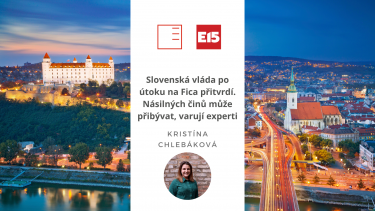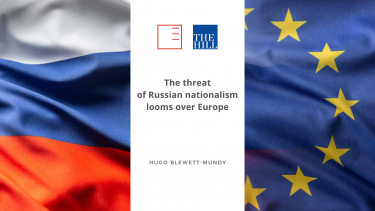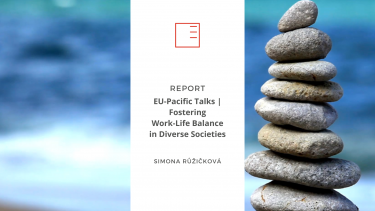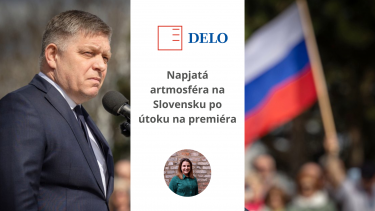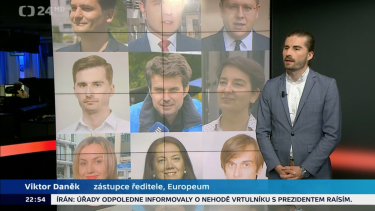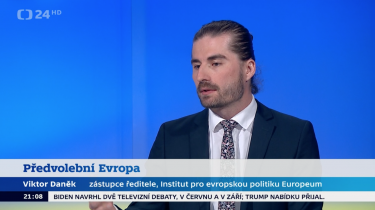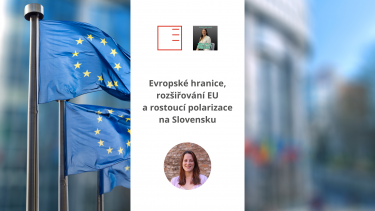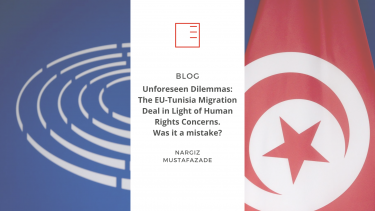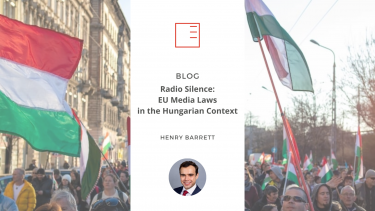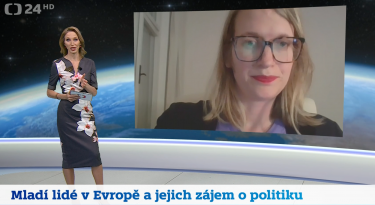e15 | Slovak government toughens up after attack on Fico. Violent acts may increase, experts warn
Democracy and the rule of law in Slovakia are in even greater danger after last week's assassination of Prime Minister Robert Fico than before. According to the local media, there are fears that government politicians, led by Fico's interim deputy Robert Kaliňák, will try to take advantage of the current situation to introduce repressive measures against the opposition and the liberal media, which could also affect local business. Project manager of EUROPEUM Institute Kristína Chlebáková comments on the situation for e15.
Show moreThe Hill | The threat of Russian nationalism looms over Europe
The threat of Russian nationalism poses a serious danger to Europe, as emphasized by the EU's High Representative for Foreign Affairs and Security Policy Josep Borrell in his speech in April. Russia is attempting to reassert its influence, particularly through its war against Ukraine, which undermines European security. What impact does the reemergence of Russian nationalism, supported by China, have on European security, and how should the West respond to this geopolitical reality? In his commentary for the American news website The Hill, Hugo Blewett-Mundy, an external collaborator and research fellow at EUROPEUM Institute, addresses this topic.
Show moreREPORT | EU-Pacific Talks: Fostering Work-Life Balance in Diverse Societies
Another in the series of EU-Pacific talks dealt with fostering work-life balance in diverse societies. The debate focused on examining current demographic trends and their social consequences in high-income countries in Europe and Southeast Asia. The discussion also touched on social systems, flexible job opportunities, and the pressures women face when balancing work and private life.
Show moreDelo | Tense artmosphere in Slovakia after the attack on the Prime Minister
The Slovak political scene has unified and called for calming political tensions following the attack on Prime Minister Robert Fico. However, there are concerns that the governing parties might exploit this tragedy to strengthen their power. It is necessary for political leaders to act responsibly and consider long-term consequences, commented Kristína Chlebáková, Project Manager at Institute EUROPEUM, for the Slovenian newspaper Delo.
Show moreNewsroom ČT24 | How journalists work in Brussels
What is the work of journalists in Brussels like? How difficult is it to find respondents for interviews? And is a lot of media in the Czech Republic interested in the EU? Viktor Daněk, Deputy Director of Institute EUROPEUM, talked about his experiences as a journalist in Brussels on the programme Newsroom ČT24.
Show moreČT24 | EU elections
According to predictions, conservative right-wing parties are expected to gain strength in the upcoming European elections. How significant will their influence be? Or do they only have blackmail potential? Will the rhetoric change in traditional EU parties as well? Viktor Daněk, Deputy Director of EUROPEUM Institute, answered these questions on the programme "Pre-election Europe" on ČT24.
Show moreTimpul Prezent | European borders, EU enlargement and growing polarization in Slovakia
What are the borders of Europe and how do they coincide with the borders of the European Union? What are the prospects for EU enlargement towards the Western Balkans and the former Soviet states? These questions are addressed by Jana Juzová, senior researcher at EUROPEUM Institute for the Timpul Prezent podcast. She also discussed the consequences of the recent attack on Slovak Prime Minister Robert Fico and highlighted the growing polarization of Slovak society and the potential threat to media independence.
Show moreBLOG | Unforeseen Dilemmas: The EU-Tunisia Migration Deal in Light of Human Rights Concerns. Was it a mistake?
Tunisia has become the main exit point for asylum seekers and refugees, especially those from sub-Saharan Africa. The EU, faced with a surge in arrivals to Lampedusa, has bolstered its cooperation with Tunisia, signing a Memorandum of Understanding with President Kais Saied. However, questions arise over the EU's handling of human rights abuses in Tunisia, reminiscent of past agreements with Turkey. Nargiz Mustafazade, a trainee in the Brussels office of EUROPEUM Institute, writes about this topic in her blog.
Show moreBLOG | Radio Silence: EU Media Laws in the Hungarian Context
The European Union has passed major legislation to try and secure media freedom and independence in recent years. However, for the state of media pluralism in certain Member States, these efforts have come too late. In the Hungarian context, a pro-ruling party media ecosystem stands well-entrenched in the private and public media sector. Writes our researcher, Henry Barrett, a Fulbright-Schuman Grantee.
Show moreČT24 | Is there growing interest among young people in European politics?
According to the Eurobarometer survey, 91% of young people aged 15-24 believe that participation in European elections is important. How does this attitude translate into practice? Does this mean that there will be an increase in voter turnout among young people? What advantages and opportunities does the European Union offer to younger citizens? Can Brussels effectively explain the benefits of EU membership to young people? These are the questions addressed by Klára Votavová, a research fellow at EUROPEUM Institute, for the Horizont programme on Czech TV.
Show moreStaroměstské náměstí 4/1
Prague 1 - Staré Město
110 00
tel.: +420 212 246 552
email: europeum@europeum.org
https://www.europeum.org
